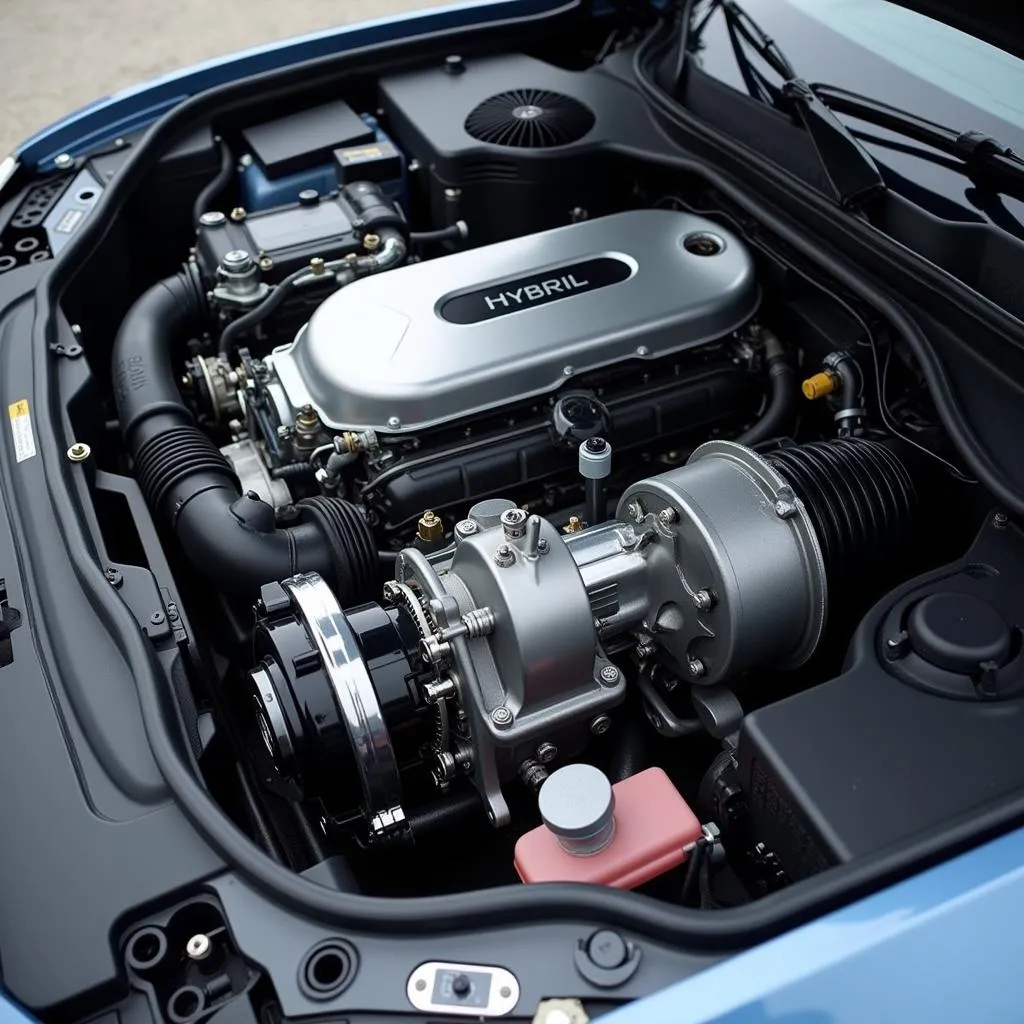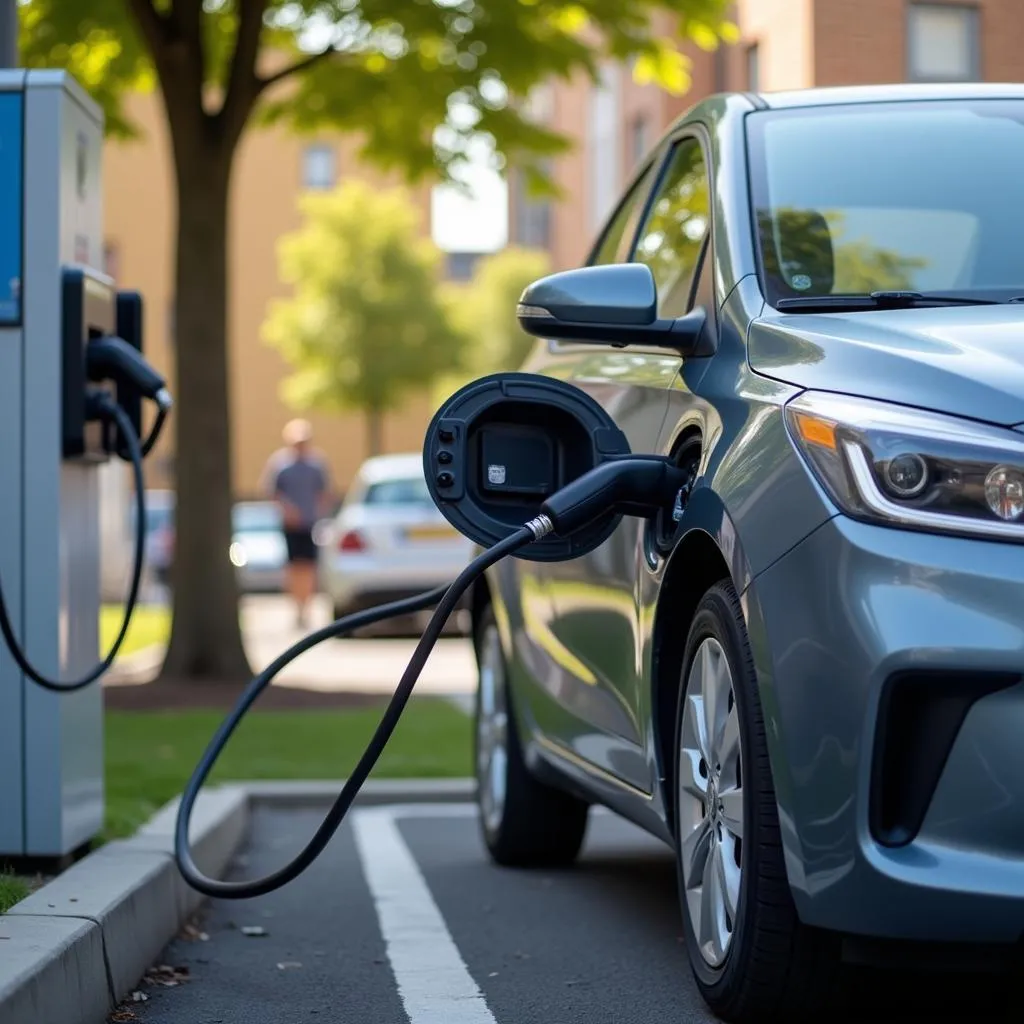Hybrid cars have quickly become a popular choice for drivers looking for a more fuel-efficient and environmentally friendly option. But what exactly is a hybrid car, and how does it work? In this comprehensive guide, we’ll delve into the hybrid car definition, explore its inner workings, and discuss the various types available in the market today.
What is a Hybrid Car?
In essence, a hybrid car is a vehicle that combines a conventional internal combustion engine with an electric motor. This dynamic duo works in tandem to power the car, resulting in improved fuel economy and reduced emissions compared to traditional gasoline-powered vehicles.
 Hybrid Car Engine
Hybrid Car Engine
How Does a Hybrid Car Work?
The magic of a hybrid car lies in its intelligent power management system, which seamlessly switches between the gasoline engine and the electric motor, or even utilizes both simultaneously, depending on the driving conditions. Here’s a breakdown of how different driving scenarios are handled:
- Starting and Low Speeds: At startup or when driving at low speeds, the electric motor takes the lead, providing a silent and emission-free experience.
- Acceleration and High Speeds: When you need an extra boost, such as during acceleration or highway driving, the gasoline engine kicks in to provide additional power.
- Cruising: When cruising at a steady speed, the hybrid system optimizes efficiency by using either the electric motor alone or a combination of both power sources.
- Braking and Deceleration: Hybrid cars are equipped with regenerative braking systems. This ingenious technology captures the kinetic energy generated during braking and converts it into electricity, which is then used to recharge the battery.
Types of Hybrid Cars
Hybrid cars come in various flavors, each offering a different level of hybridization and electric-only driving range. Let’s explore the most common types:
1. Parallel Hybrids
Parallel hybrids represent the most common type of hybrid vehicle. In this configuration, both the gasoline engine and the electric motor are connected to the wheels through a single transmission. The system seamlessly switches between the two power sources or blends their power to optimize efficiency and performance.
2. Series Hybrids
Series hybrids, also known as range-extended electric vehicles (REEVs), take a different approach. In this setup, the gasoline engine acts as a generator, producing electricity to power the electric motor, which in turn drives the wheels. While the gasoline engine doesn’t directly power the wheels, it extends the vehicle’s range beyond what the battery alone could achieve.
3. Plug-in Hybrids (PHEVs)
Plug-in hybrids offer the best of both worlds, allowing drivers to enjoy extended electric-only driving range while still having the convenience of a gasoline engine for longer trips. PHEVs come equipped with larger battery packs that can be plugged into a standard electrical outlet to recharge.
Advantages of Hybrid Cars
The increasing popularity of hybrid cars can be attributed to their numerous benefits, which include:
- Enhanced Fuel Efficiency: Hybrid cars excel at squeezing the most miles out of a gallon of fuel, significantly reducing fuel costs over the long run.
- Reduced Emissions: By combining electric power with a gasoline engine, hybrid cars produce fewer emissions, contributing to a cleaner environment.
- Smooth and Quiet Ride: The electric motor in a hybrid car allows for near-silent operation, especially during low-speed driving, providing a serene and enjoyable driving experience.
- Regenerative Braking: The ability to recapture energy during braking further enhances efficiency and reduces wear and tear on the traditional braking system.
Disadvantages of Hybrid Cars
While hybrid cars offer numerous advantages, there are a few considerations to keep in mind:
- Higher Initial Cost: Hybrid cars typically come with a higher price tag compared to their gasoline-powered counterparts. However, government incentives and long-term fuel savings can help offset this initial investment.
- Battery Life and Replacement: The battery pack in a hybrid car has a limited lifespan and will eventually need replacement, which can be an expensive endeavor.
- Performance Considerations: While hybrid cars have made significant strides in performance, some drivers may find the acceleration and overall power delivery to be less exhilarating compared to traditional sports cars.
 Hybrid Car Charging
Hybrid Car Charging
Conclusion
Hybrid cars have emerged as a compelling solution for drivers seeking a balance between fuel efficiency, environmental consciousness, and practicality. Understanding the hybrid car definition and its various types can empower you to make an informed decision when choosing your next vehicle.
FAQs
1. How much does a hybrid car battery cost?
The cost of a hybrid car battery can vary depending on the make and model of the vehicle. On average, you can expect to pay between $1,000 and $8,000 for a replacement battery.
2. Do hybrid cars need to be plugged in?
Traditional hybrid cars do not need to be plugged in. They recharge their batteries through regenerative braking and the gasoline engine. However, plug-in hybrid electric vehicles (PHEVs) do require plugging in to recharge their larger battery packs.
3. How long do hybrid car batteries last?
Hybrid car batteries are designed to last for a significant portion of the vehicle’s lifespan. Most manufacturers offer warranties on hybrid batteries for 8 years or 100,000 miles, whichever comes first.
4. Are hybrid cars worth the extra cost?
The value proposition of a hybrid car depends on individual driving habits and priorities. If you prioritize fuel efficiency and environmental friendliness, the long-term fuel savings and reduced emissions can make a hybrid car a worthwhile investment.
5. What are the different types of hybrid cars available?
The most common types of hybrid cars include parallel hybrids, series hybrids (range-extended electric vehicles), and plug-in hybrid electric vehicles (PHEVs). Each type offers a different level of hybridization and electric-only driving range.
For more information on fuel-efficient vehicles, check out our articles on best fuel mileage cars and good suv cars.
If you’re curious about the broader world of hybrid and electric cars, you might be interested in our article on hybrid car what is.
For those interested in high-performance vehicles, our article on the highest horsepower car might pique your interest.
Looking for used car options? Explore our insights on echo park cars.
For any further assistance, feel free to reach out to us via WhatsApp: +1(641)206-8880, Email: [email protected] Or visit us at: 276 Reock St, City of Orange, NJ 07050, United States. Our dedicated customer support team is available 24/7 to assist you.


